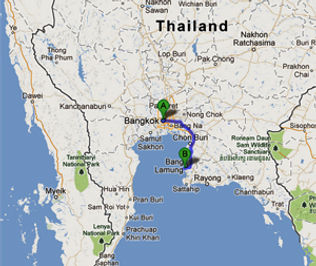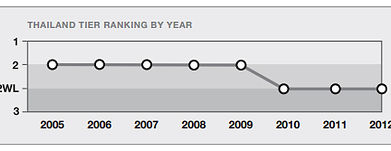Schuster Institute for Investigative Journalism
at Brandeis University
i n v e s t i g a t i o n s

Human Trafficking Stories
from Boston to Bangkok
Photo | 承燁 韓
Sex Trafficking from
Bangkok to Boston
Photo | 承燁 韓
WGBH Boston Public Radio
By Phillip Martin
Thursday, January 17, 2013
Special Report: Human Trafficking
"Underground Trade: From Boston to Bangkok" is a WGBH eight-part investigation by Schuster Institute Senior Fellow Phillip Martin into human trafficking, from East Asia to New York to New England.
Part 4: One Town in Thailand
WGBH Investigations reports: Phillip Martin takes a look at sex tourism on the ground in Thailand, its relationship to human trafficking, and the people who are trying to stop it.
Listen to the broadcast, "One Town in Thailand, " at WGBH Boston Public Radio.
The Town: Pattaya, Thailand
Since then, Pattaya has had a bustling sex industry, and one that is now infiltrated by the Russian mafia franchised to the Uzbek mafia, says Matt Friedman, regional manager for the United Nations Inter-Agency Project on Human Trafficking, in an interview with Phillip Martin. It's a problem, Friedman says, the Thai government will have to do more to address.
Uzbek organized crime in Thailand is the focus of this 2012 documentary by National Geographic. A NatGeo film crew followed Thai government special forces, Steve Galster of the Freeland Foundation, and others in an international team of undercover investigators working to rescue victims of international sex trafficking from Central Asia to Bangkok to Pattaya.
Human Trafficking From Pattaya
While human trafficking victims are brought into Pattaya to service sex tourists, they are also transported out for similar purposes.
Pattaya is a prime spot for human traffickers on the lookout for vulnerable prey. Few economic opportunities in the area lead some women and men to seek a better life outside of Thailand, says Friedman, who considers Pattaya an "incubation place" for human trafficking. “Potential opportunistic pimps will go in there and say, ‘I have this great opportunity. We can bring you to the United States, and you can make four or five times what you’re making here, and you can live a very good life, and you’ll basically be able to have a lot of money and freedom.’"
Freidman adds that once in the American Northeast, those forced into the sex trade may be shuttled up and down the coast every few weeks. At an October 19, 2012 arraignment at Dedham District Court, a prosecutor described one incident of this cycling of women between New York and Massachusetts by the owners of Sun Studios (also known as Sun Spa) in Wellesley. The owners had been arrested for being part of a human trafficking and prostitution ring in Needham, Burlington, Wellesley, and Revere, according to Fox25 News.
Learn more about migration and the points at which a person may become victimized.
Child Sexual Exploitation
Sex tourism also provides opportunities for pedophiles and other child predators as a 2009 sting operation in Cambodia confirmed. Often believing that finding a child sexual partner will be easy and cheap, and that they will not be prosecuted for child sexual exploitation, child predators head from richer countries to less-developed destinations like the Pattaya resort in Thailand and similar spots in countries around the world, says Bangkok-based nonprofit End Child Prostitution and Trafficking.
At the Anti-Human Trafficking and Child Abuse Center 45 minutes outside of Pattaya where Martin did interviews for "Underground Trade," a 12-year old boy told Martin that American men ask for him by name.
Learn more pedofillia in this new documentary film "While No One Is Watching," a new documentary by Journeyman TV.
Learn more about child sex tourism and what's being done to stop it.
Thailand's Anti-Human Trafficking Track Record
"Thailand is a key destination for child sex tourists and pedophiles, although stepped-up local and international policing [in Thailand] has forced more foreign sex tourists to travel to neighbouring countries, such as Cambodia, where official sanctions may be weaker," says Ron Corben for The Sydney Morning Herald.
The Thai government has enacted anti-trafficking in persons legislation. The United Nations Inter-Agency Project on Human Trafficking lists the major laws for Thailand as follows:
In June 2008, Thailand enacted the Anti-Trafficking in Persons Act (B.E. 2551 / 2008).
Besides this Act, there are several other laws which criminalize human trafficking activities and offences, including:
-
Labour Protection Act (2008)
-
Child Protection Act (2003)
-
Anti-Money Laundering Act (1999)
-
Penal Code Amendment Act (1997)
-
Criminal Procedure Amendment Act (1997)
-
Prevention and Suppression of Prostitution Act (1996)
-
Amendments to the Securities and Exchange Act (1992)
-
Immigration Act (1979).
These laws allow for severe penalties for individuals found guilty of charges relating to forcing people into prostitution, exploitative labor, forced begging and other inhumane acts.
Read more from the UNIAP's SIREN report about Thailand that includes trends, laws, data from cases that have been prosecuted, and other information about policy, prosecution, and prevention efforts.
The U.S. State Department's Trafficking in Persons Report 2012
In spite of these anti-trafficking laws and the work of government task forces and NGO activist organizations, Thailand is listed for the third consecutive year as a Tier 2 Watch country by the U.S. Department of State's 2012 Trafficking in Persons Report.
In the midst of concerns that Thailand may slip into Tier 3, reserved for countries with the worst track records in combating human trafficking and modern-day slavery, Thailand's Labour Ministry is rallying businesses to work together to fight human trafficking and child sexual exploitation, according to a report for Pattaya Mail.
Each year since 2001 the U.S. State Department's Office to Monitor and Combat Trafficking in Persons investigates human trafficking and modern-day slavery in countries around the world.
Read Trafficking in Persons Reports for Thailand from 2007 to 2012>
See all the Trafficking in Persons Reports>
Pattaya Tries to Cleans Up
In recent years, the Pattaya tourism industry has been trying to diversify its attractions, as the following BBC report explains. They must be doing something right: In 2012, a record-breaking eight million tourists visited Pattaya.

The seaside resort town of Pattaya is about a two hour drive from Bangkok and well-known as a destination for sex tourists. Many outsiders, including Thomas Fuller for the New York Times, describe it as the ultimate city of sleaze. Originally a fishing village, Fuller says, American soldiers fighting in the Vietnam War discovered Pattaya, and "armed with dollars [they] sought respite from the war in a country of relative poverty, lax law enforcement and historically tolerant attitudes toward prostitution."

Part 1 : Hiding in Plain Sight
2 : The Route Through Queens
3 : The Business of Trafficking
4 : One Town In Thailand
6 : Trading in Shame
7 : Modern-Day Slavery in America
8 : Human Trafficking: What Now?
Special Report: Human Trafficking Underground Trade: From Boston to Bangkok is an eight-part investigation into human trafficking from East Asia to the Northeast Corridor of the United States by
Phillip Martin, senior investigative reporter at WGBH Boston Public Radio and a senior fellow at the Schuster Institute for Investigative Journalism at Brandeis University.
The WGBH investigation was done in collaboration with the International Center for Journalists, the Ford Foundation, and the Schuster Institute for Investigative Journalism.
Claire Pavlik Purgus, Schuster Institute managing editor, conceptualized, designed and edited this site which provides supporting documentation and context for WGBH Radio's human trafficking investigation, "Underground Trade: From Boston to Bangkok" and
PBS American Experience's
"The Abolitionists."
Sophie Elsner, Schuster Institute research editor, supervised research by Brandeis students who work as Research Assistants at the Schuster Institute.
Students who contributed research:
Sidra Ahmed
David Altman
Damiana Andonova
Simon Cramer
Lydia Emmanouilidou
Dafna Fine
Ariel Glickman
Shafaq Hasan
Elly Kalfus
Lindi Li
Alisa Partlan
Avi Snyder
Andrew Wingens
Madeline Ziff
More Schuster Institute
Resources
U.S. Anti-
Human Trafficking Legislation
The Trafficking Victims Protection Act (TVPA) was the first comprehensive federal law in the United States to address human trafficking. It is currently waiting reauthorization by Congress.
Learn more about U.S. federal laws pertaining to human trafficking at the State Department's website.
The Polaris Project ranks U.S. states on factors including legislation. Find out how your state ranked in 2012>


